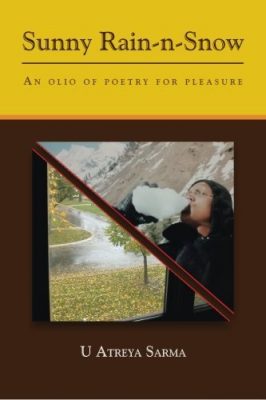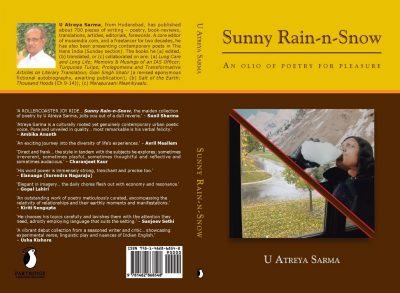Review
By
Subashish Bhattacharjee
Hues of Delectation and Interfaces of the Beatific
The fondest cinematic memory I have nourished since my childhood has been a scene of Satyajit Ray’s Pather Panchali (‘The Song of the Road’) where Apu and Durga, the siblings are seen sprinting to match the pace of the distant train. The scene has never failed to invoke and elicit a sense of association, of longing and belonging in me. This was the effect of an artwork so profound that it integrated my sense of self into the unlived experiences.
And by an extension of the above analogy, I have very recently had the fortunate experience to read a profound work of art that led my consciousness on a whirlwind peregrination across the mindscapes of the poet. Sunny Rain-n-Snow is an ‘olio of poetry for pleasure’, as the cover defends and the ensuing poems fortify, by seasoned poet and editor, U Atreya Sarma, that produces a bouquet of feelings which I believe no reader would want to depreciate, and the poems themselves do not allow obsoletion.
Here is a poet whose sense of poetic cadence is strongly entrenched in the present or in presence, in the immanent. Instead of building transcendental and metaphysical connections that astound with their impossibility, the poems are immersive, they force the reader to delve into the consciousness of the poet’s verses willingly, to attach oneself like a symbiont to the symbiote of Sunny Rain-n-Snow. The synergy and synthesis between these poems and memory, emotions and experiences becomes a mutual ground, the event of reading ever-new, and personal, despite my reading the entire volume three times within the span of less than a week. The poems do not have the blatant esoteric nature of forced poets, but the carefully gleaned freedom that a parent can attribute to his child. The poems evolve and transpose into seasons, into living organisms that shift and relocate themselves with surprising agility of thought.
There are certain works of art that disallow the readers to be overly complex while processing them—this is not a failure of such works but rather a glorious success in that they create a rupture so enormous that erases the artifices of intellect and vainglory. This statement can no more be proven through specimen than the poems in Sunny Rain-n-Snow—there is no air of affected seriousness nor any pretension of artificial simplicity for the mere affiliation to the quotidian or the ubiquitous. The poems exist to fulfill the necessity of the work of art: to produce and elicit unadulterated pleasure sans artifice or assumption.
These poems are the effect of a cultivated yet spontaneous writing that resonates the psychology of the individual with the universal. Perhaps this is the reason the poet interjects resoundingly in his poem “That my poetry is, too…” And when the poem deftly manoeuvres into the concluding line and states “My muse is only as good or bad as Nature herself,” the poet and his poem are both successful as I have dutifully followed the poetic rationalization to its wondrous conclusion.
There are chiaroscuros in the book that are produced by the juxtaposition of light and more light in lieu of darkness. To this effect the Preface contains a statement that rings true throughout the selection of poems:
“Every poet generates his ideas like the droplets of rain falling to the earth. He broods over them and airs them in the ether of his mind. When they acquire enough strength they coalesce and shower down with greater intensity and density, in the form of snow, sometimes solidifying into ice.”
The insistence on careful cultivation is a consistent belief and conceptual system in the book of poems. It does not tax the mind into construing such lineages that may unravel trajectories of the poems as emanating from the poet’s subconscious. The poems, instead, have a latent tendency to make the reader, or more precisely here, me, lose myself “in a dreamy and soulful oblivion” (“Wow, what a white magic!”). The preamble to “Man… Powerful or Powerless?” can act as an introducer to the potent nature of the book:
“With wonder-wide eyes man delved
Deep into the myriad mysteries;
Nothing is far! Moon or Mars, or Matter
Beyond aeons-long light-years of galaxies.”
The poems are about the escapades of people as we know them into a surreal normalcy. The adventurous spirit that guides the creativity behind such poems is also the same that grants us with the visionary ability to engross ourselves with the presentness of the poetic agility on display. The poetics of events and places are rendered with the same degree of intricateness, as can be exemplified through the following excerpt from “Tons of blooms”:
“The sun was too touched by the spectacle earthly;
Utterly helpless to give embraces warmly,
Behind a screen of cerulean drapes he slid;
Yet to share some smiles of light, he would do his bid.”
Two of the most congenitally graphic poems in the book are sited almost together—“Aesthetic to the bathetic” and “Cerulean cornucopia.” The sequences are idyllic and concrete, shifting without hesitation from the personal to the universal, from the microcosmic to the macrocosmic and back, positioned like waves that ebb and flow. The introspective meter of the poems is a habitus that emancipates meanings to emerge as butterflies from their rhythmic chrysalis, a metamorphosis that astounds the reader with each successive emanation of image. For instance, the rhythmicity of “Aesthetic to the bathetic”:
“I looked up at the sky; the ceiling was like an endless, wave-less deluge,
Trees and bushes down under gaily bathed, shedding tears of joy;
Blossoms everywhere were gently swaying in their coy blushes;
While on the wet ground the blades of grass glistened
With their pearly surface in the faint light of the unseen sun.”
And its similarly aesthetic corollary in “Cerulean cornucopia”:
“Then there was an astronomically long-curved bow-strip
Valiantly stretched across the sky, with the earth beneath.
Her apparent flatness served as the taut, tensile string
And the half-moon took up the role of an arrowhead!”
There is a rationale behind the imagination that reveals itself progressively through the poems. This is consequent to the flow of inventiveness and contrivances that for less mature poets would be forced, but in the deft poetic craftsmanship that has constructed Sunny Rain-n-Snow, are the ideal expression of a resonant song of humanity.
The poems have appealed to me for more than their manifest value. They are precious in a way that resembles Henri Bergson’s concept of the durée, a long-term discourse of the validity that is reminiscent of such poems, series and anthologies as Kolatkar’s Jejuri, Ramanujan’s The Striders, or Mahapatra’s Relationship. In an atmosphere rife with the gradual increase in the volume of poetic output and the general decline of poetic sense, the book appears as a fresh lease of life for Indian English poetry, whose futures had very recently been lamented upon by certain critics as ‘belonging in the past’. The book is undoubtedly a passion project but not a work of art that exists merely for the purpose of existing, that does not possess any function beyond form. The function of the book is to produce pleasure and it excels at doing so.
I have read the book avidly, as only one smitten by its virtuosity and exotic rhythms can; I have also read it with a deliberate dissociation, following Matthew Arnold’s dictum, so as to shred the subjective tint that the poems have produced in me. In both the readings I have encountered the unanimity of a sense of kvell when I realized that the book that I am privileged to read at this juncture of my life will feature prominently in my sizeable bookshelf for a lifetime. Ought I to recommend the book for preservation? Yes. Not as a purely literary or social artifact but as a privileged work of literary art that could restore faith in poetic accomplishments. Sunny Rain-n-Snow is an enthralling work that has bolstered an avidity to wait, eagerly, for U Atreya Sarma’s successor to the book. Until then I shall content myself with reading the present book until I have successfully and psychologically imbibed the creative acumen of the present book.
Sunny Rain-n-Snow | Collection of Poetry | U Atreya Sarma | Partridge India. 2016 | ISBN-10: 1482868547 | ISBN-13: 978-1482868548 | Pages 158 | Paperback $ 9.99 | Rs 399 | Kindle $ 2.54 | Rs 169 | Flipkart Rs 360 | EBOOK (Google Play) Rs 118.30
U Atreya Sarma
U Atreya Sarma from Hyderabad (India) is a poet, reviewer, translator and freelance editor with 18 years of experience. His output comprises about 250 poems and 450 articles. His maiden collection of English poems is Sunny Rain-n-Snow (May 2016). He is a core Editor of Muse India.





No Comments Yet!
You can be first to comment this post!